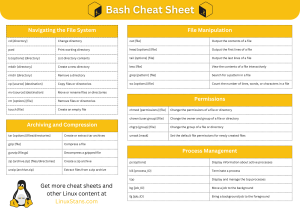This Bash cheat sheet provides a quick reference guide to commonly used commands in the Bash shell. Whether you’re a beginner or an experienced user, this cheat sheet will help you navigate the Linux command line and perform various tasks efficiently. You can also download a high quality printable version of this cheat sheet below.
| Navigating the File System | |
|---|---|
cd [directory] | Change directory |
pwd | Print working directory |
ls [options] [directory] | List directory contents |
mkdir [directory] | Create a new directory |
rmdir [directory] | Remove a directory |
cp [source] [destination] | Copy files or directories |
mv [source] [destination] | Move or rename files or directories |
rm [options] [file] | Remove files or directories |
touch [file] | Create an empty file |
| Process Management | |
|---|---|
ps [options] | Display information about active processes |
kill [process_ID] | Terminate a process |
top | Display and manage the top processes |
bg [job_ID] | Move a job to the background |
fg [job_ID] | Bring a background job to the foreground |
The commands are organized into different categories to make it easier to find what you need. From navigating the file system to manipulating files, managing processes, and working with permissions, this cheat sheet covers a wide range of essential Bash commands.
Each command is presented in a clear and concise format, enclosed in code tags for easy identification. Additionally, options and arguments are included where applicable to provide further context and usage examples.
Feel free to refer to this cheat sheet whenever you need a quick reminder or want to explore new Bash commands. With practice, you’ll become more proficient in using the Bash shell and streamline your workflow on the command line.
| File Manipulation | |
|---|---|
cat [file] | Output the contents of a file |
head [options] [file] | Output the first lines of a file |
tail [options] [file] | Output the last lines of a file |
less [file] | View the contents of a file interactively |
grep [pattern] [file] | Search for a pattern in a file |
wc [options] [file] | Count the number of lines, words, or characters in a file |
| Permissions | |
|---|---|
chmod [permissions] [file] | Change the permissions of a file or directory |
chown [user:group] [file] | Change the owner and group of a file or directory |
chgrp [group] [file] | Change the group of a file or directory |
umask [mask] | Set the default file permissions for newly created files |
| Archiving and Compression | |
|---|---|
tar [options] [files/directories] | Create or extract tar archives |
gzip [file] | Compress a file |
gunzip [file.gz] | Decompress a gzipped file |
zip [archive.zip] [files/directories] | Create a zip archive |
unzip [archive.zip] | Extract files from a zip archive |


One thought on “Basic Bash (CLI) Cheat Sheet”
I taught Linux for entertainment. Linux is the 18 operatng system in my lifetime. I am an old man now at 75. The one thing that gets me upset is using the acrrnym CLI in reference to the Shell you choose in Unix Linux. AIX uses natively the KSH korn shell. Solaris and IRIX use the TCSH shell. Red Hat and most Linux distributions use the BASH or Born SHELL. Why do I get my pantys in a wad. Because the SHELL is a way to talk to the Kernel. Yes you can issue commands to the KERNEL. But you can issue instructions to higher level pprogramming languages through the SHELL. You can issue instructions to the Kernel through the SHELL. Even the GUI uses the SHELL underneath. You can accomplish all Mouse inputs through the SHELL To say the shell is a way of sending commands. Is a limited statement and my OS is only limited to the commands I enter through the keyboard. The fact that you are the least intelligent component of your Kernel. So set aside the Bill Gates term CLI. Your not using that limited Operating System.
Enjoy the blessing Linus Torvalds has given you. There hundreds of thousands of contributors to Linux. All of them have contributed their works to you through the GPL. Meaning you are not required to pay for this pleasure. They will not refuse a gift though. So for the respect of the Linux Community do not pollute Linux with Windows language.
Francis